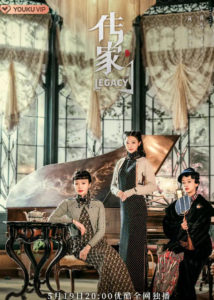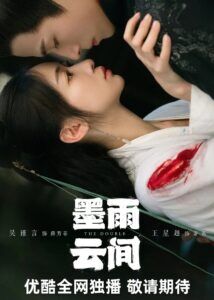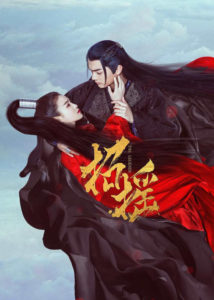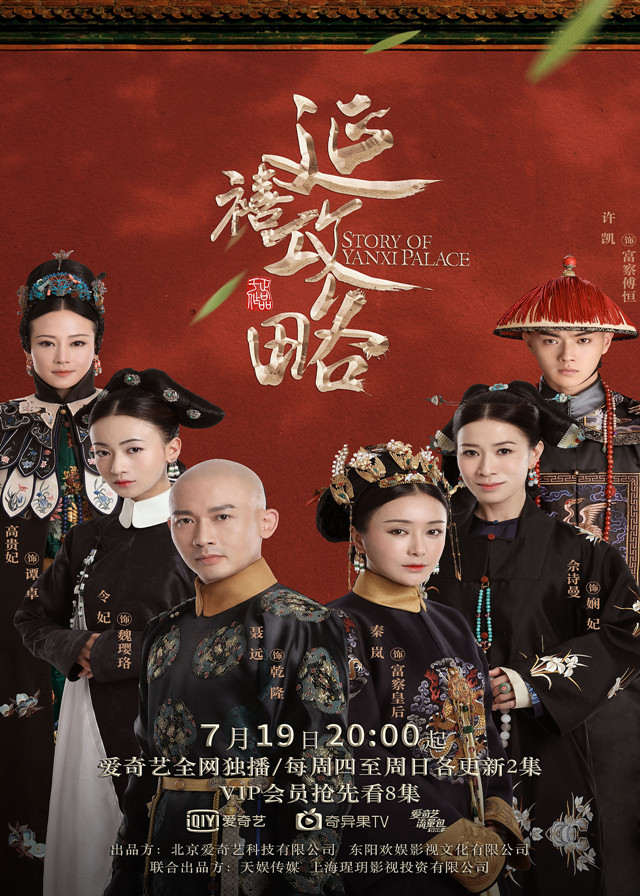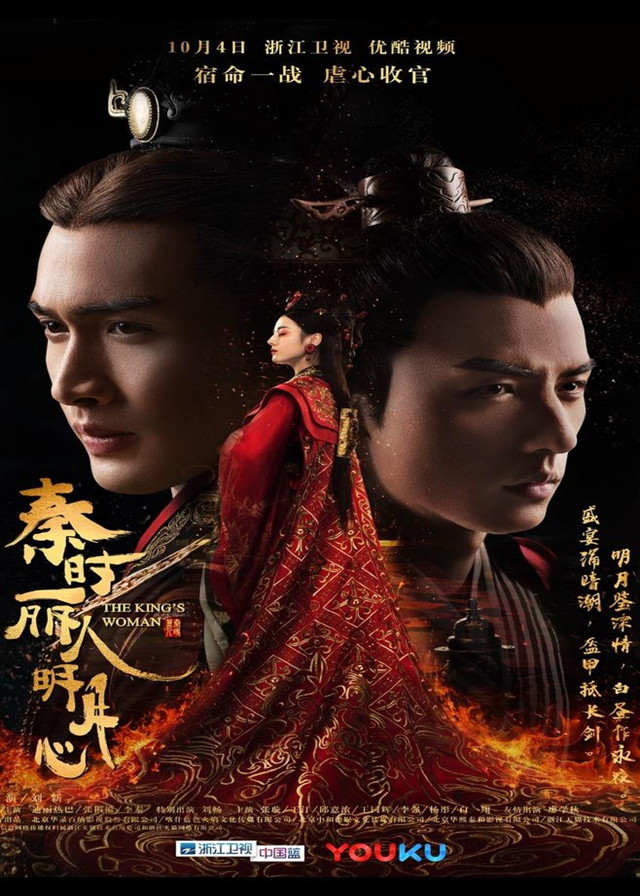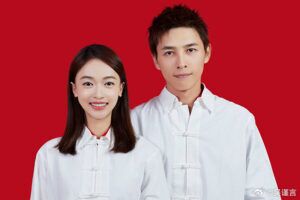Story of Yanxi Palace Episode 50 Recap
> Story of Yanxi Palace Recap
- 1
- 2
- 3
- 4
- 5
- 6
- 7
- 8
- 9
- 10
- 11
- 12
- 13
- 14
- 15
- 16
- 17
- 18
- 19
- 20
- 21
- 22
- 23
- 24
- 25
- 26
- 27
- 28
- 29
- 30
- 31
- 32
- 33
- 34
- 35
- 36
- 37
- 38
- 39
- 40
- 41
- 42
- 43
- 44
- 45
- 46
- 47
- 48
- 49
- 50
- 51
- 52
- 53
- 54
- 55
- 56
- 57
- 58
- 59
- 60
- 61
- 62
- 63
- 64
- 65
- 66
- 67
- 68
- 69
- 70
Following the investigation into Wei Yingluo's riding accident, Hailancha reported to the Emperor that although foul play was certain, the interrogated supervisors and eunuchs of the Imperial Horsemasters all pleaded innocent, yielding no leads. Sensing the futility of a wider investigation, the Emperor ordered the eunuch directly responsible for the horse to receive eighty heavy strokes, while the rest were fined a year's wages and released. The Emperor then paid an unannounced visit to Noble Consort Chun at Zhongcui Palace.
He observed her joyous demeanor, prompting her to feign concern for Wei Yingluo's severe injuries. Noble Consort Chun insisted she was deeply worried and offered to send precious herbs for her recovery. The Emperor, however, saw through her pretense. He remarked that overly clever people can be outsmarted by their own machinations, subtly revealing his suspicion that she had tampered with the horse.
He reasoned that the Empress had no motive and other concubines lacked the audacity, leaving Noble Consort Chun as the most likely culprit. She vehemently denied any involvement, proclaiming her long-standing loyalty and desire for nothing more than his affection. The Emperor countered that before Wei Yingluo's rise, Noble Consort Chun was the most favored, and thus her current diminished status gave her the strongest motive.
Noble Consort Chun defended herself by claiming she had always advocated for the Emperor to be impartial to foster harmony. She then shifted blame, criticizing Wei Yingluo for being overly dominant and conspicuous, suggesting this behavior was the true cause of someone seeking revenge. Despite her swearing innocence to the heavens, the Emperor sternly warned her that the more one desires, the more one stands to lose, advising her to consider the Sixth Prince before acting rashly.
He concluded by expressing his hope that she was not involved, urging her not to disappoint him. After the Emperor's departure, a furious Noble Consort Chun berated Consort Yu for her incompetence, implying their plot was nearly exposed. Consort Yu, while surprised the Emperor had risked his own life to save Wei Yingluo, assured Noble Consort Chun that all involved parties had been heavily bribed into silence.
Noble Consort Chun, unconvinced, warned Consort Yu that if the investigation continued, her son, Yong Qi, would be in danger. Distressed, Consort Yu went to Yanxi Palace to see Wei Yingluo. Though initially denied entry, she was eventually permitted to see Wei Yingluo, who immediately confronted her. Wei Yingluo accused her of betraying the late Empress's kindness by siding with Noble Consort Chun.
Consort Yu defended her actions as a matter of survival, claiming that unlike Wei Yingluo, she had no powerful protectors and had to align with Noble Consort Chun. When Wei Yingluo revealed Noble Consort Chun's role in the deaths of the Seventh Prince and the late Empress, Consort Yu refused to listen, stating her only goal was to protect Yong Qi.
Wei Yingluo bitterly called her ungrateful, but Consort Yu tearfully recounted her life as an unfavored concubine, forced to be dependent and submissive to survive. She argued that the late Empress, while kind, couldn't even protect herself, and that Wei Yingluo had given her hope only to leave her vulnerable, at which point only Noble Consort Chun had offered support. Consort Yu then begged Wei Yingluo to drop the investigation, fearing Noble Consort Chun would frame her as a scapegoat.
She pleaded for Yong Qi's sake, reminding Wei Yingluo that she had once saved him. Ming Yu was appalled, but Consort Yu pressed on, suggesting they reconcile with Noble Consort Chun for the sake of peace and future security. She promised to ensure Wei Yingluo's safety if she agreed. Contemplating the recent attempt on her life, Wei Yingluo asked Ming Yu if she truly wanted her to make more enemies, signaling her reluctant agreement.
Later, Consort Yu watched Yong Qi proudly practice his calligraphy, quoting his teacher on how an upright mind leads to an upright hand. Moved to tears by his growth, she told him she was taking him to meet someone he must please to ensure his future safety. Meanwhile, the Empress was embroidering a knee guard for her father, Lord Naerbu, whose arthritis was worsening. She was interrupted by news that her father had arrived at Qianqing Gate, requesting an audience.
He had completed his disaster relief work in Eastern Zhejiang and returned for his late wife's anniversary. However, with the palace gates about to lock, the Empress prioritized protocol over a personal visit, refusing to meet him to avoid criticism. She sent a message promising to see him another day. Lord Naerbu, crestfallen, accepted her refusal, sensing it was his last chance to see her.
At the same time, the Emperor discovered Hong Zhou trying to intercept a memorial impeaching Lord Naerbu. The Emperor revealed the charges: Naerbu was accused of embezzling relief funds, providing watery porridge that led to a riot with nearly 200 deaths and over 500 injuries. He was immediately imprisoned. Upon hearing the news, the Empress desperately rushed to the Emperor's hall. Forcing her way past the guards and losing her composure, she pleaded her father's innocence.
The Emperor presented evidence that less than a third of the relief grain remained in the warehouse. The Empress passionately defended her father's decades of honest service, recounting his selfless dedication during a flood years prior. Tearfully, she confessed her father had tried to see her to say goodbye, and she had turned him away, a failure she deeply regretted. Moved, the Emperor promised to handle the case according to the law.
Outside, a concerned Hong Zhou comforted the weeping Empress, vowing to clear her father's name. The Emperor later sought counsel from the Empress Dowager, who correctly surmised his conflict. The Emperor admitted that an investigation by Hong Zhou confirmed that the relief provisions had been embezzled by corrupt officials at every level, leaving Naerbu with almost nothing to distribute. The Empress Dowager, however, argued that while loyal, Naerbu was incompetent.
She pointed out that his was the only relief center to erupt in a deadly riot and that his inability to control the situation reflected poorly on the Qing government. She advocated for Naerbu's execution to pacify public anger. The Emperor was aghast, but she explained that a full investigation would implicate countless officials, including the Emperor's own relatives, and destabilize the imperial clan. She urged him to deal with the corruption slowly and patiently.
The Emperor refused to sacrifice an innocent man, but the Empress Dowager countered that Naerbu was incompetent, not innocent. She argued that executing him—especially as he was the Empress's last living relative—would prove to the world that the Emperor's justice was impartial and above personal ties, thus preserving the reputation of the imperial family at the cost of one life. The Emperor, believing this would set a terrible precedent, said he needed time to think.
Throughout this deliberation, the Empress knelt outside the Emperor's hall, refusing to leave until he saw her. Petitions from the people of Eastern Zhejiang demanding Lord Naerbu's execution flooded the court. Overwhelmed, the Emperor asked Hailancha for his opinion. Hailancha, surprisingly, echoed the Empress Dowager, advising the Emperor to execute Naerbu without hesitation. He reasoned that killing one man would appease the people, whereas punishing the entire network of corrupt officials would cause chaos.
As the Empress continued her vigil through the night, the Emperor finally emerged in the morning. Looking down at her, he asked, "You've knelt for a whole night. Are you threatening me?"





